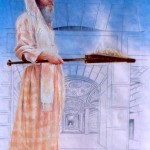Tzav 5772 — Removing the Ashes
And he shall take off his garments, and put on other garments, and carry the ashes outside the camp to a clean place. …Leviticus 6:4
Why did God need to make it a commandment to remove the ashes from the altar and carry them outside the camp?
In his work of mussar, Duties of the Heart, Rabbenu Bahya Ibn Pakuda says that this is a commandment given to bring some humility to the priests serving in the Temple. Every day the kohenim, the priests, start their day by taking off their fancy clothes and doing a mundane, dirty task: clearing out the ashes from yesterday’s offerings. Rabbenu Bahya says this is “in order to humble himself and remove the haughtiness from his heart.”
It’s not only priests serving in the Temple who need this advice: anyone who wants to grow as a person needs to approach life with an attitude of humility. A puffed up ego will say “I’m perfect,” and prevent any growth or learning from happening. This is an especially appropriate message this week, in the days before Passover, a holiday when we are commanded to remove the leaven, the “puffed up stuff” from our homes and from our hearts.
The commandment to remove the previous day’s ashes can have additional symbolic value for us. We all have “ashes” — stuff leftover, the residue from yesterday — that can dirty and clog up the altar of our lives. We can make an effort to start each day by removing the emotional baggage, the ashes from yesterday, that can block our flame from burning brightly. We can choose to remove those ashes, start each day fresh, ready to begin anew.
As we approach Passover, the season of renewal, we start by removing the chametz — and the ashes with it — beginning a new season with a humble spirit, yet a spirit also unburdened by the ashes of yesterday.
Shabbat shalom,
Rav Barry

